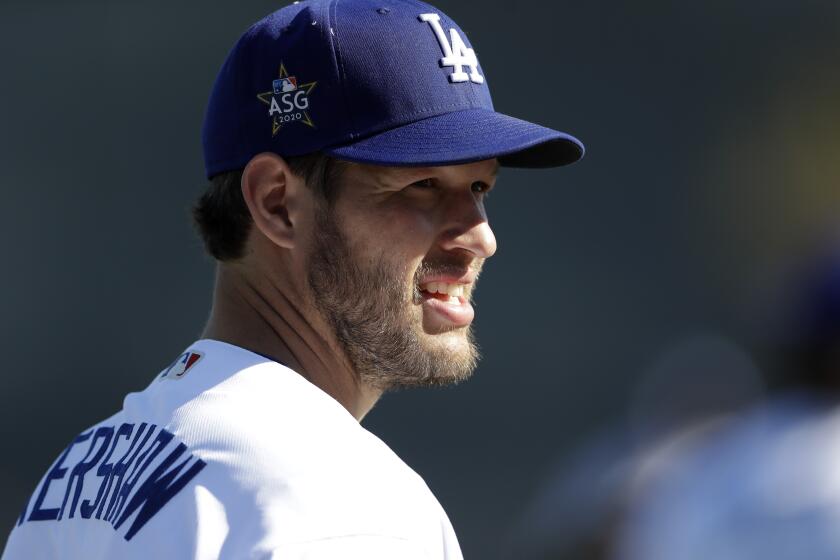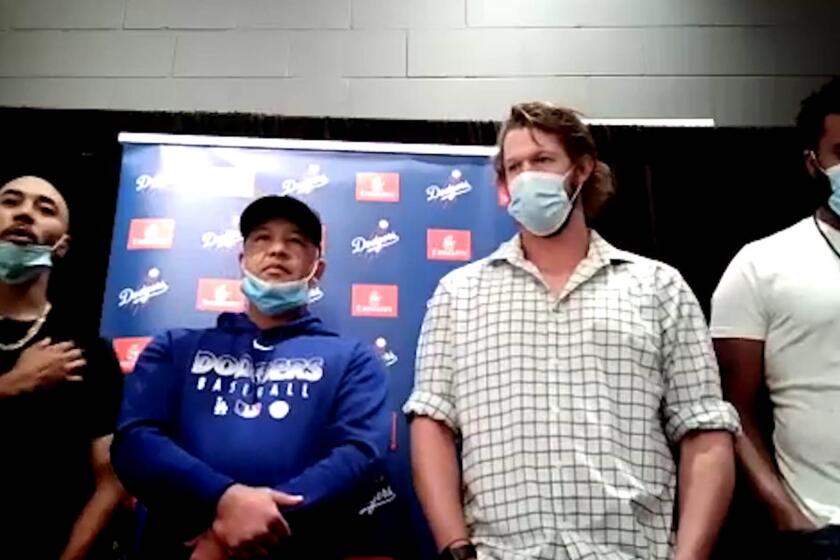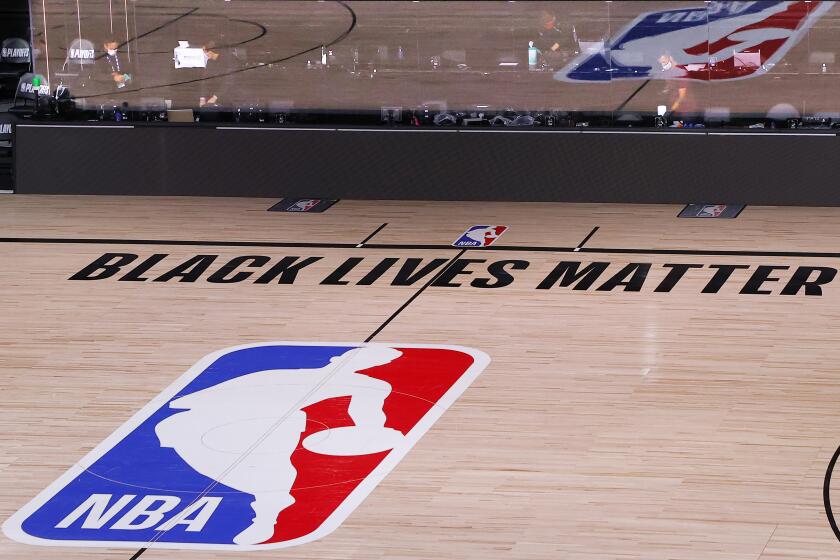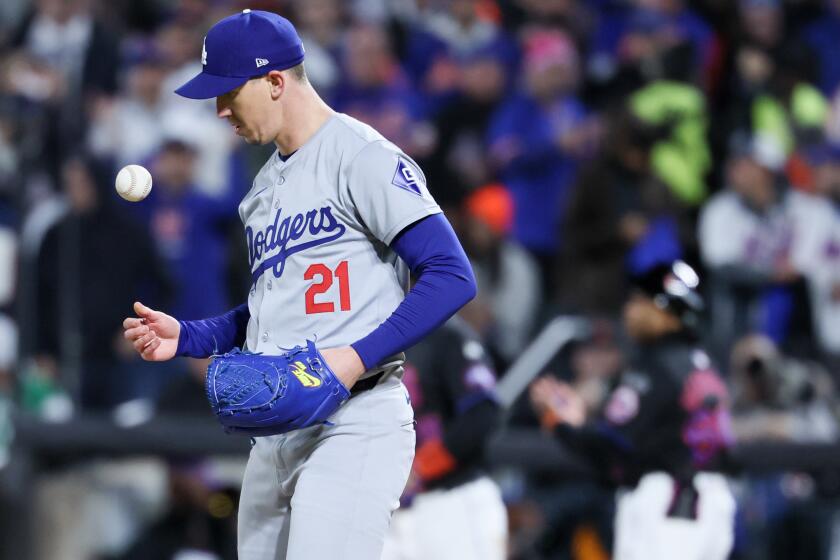Column: Mookie Betts and the Dodgers honor team’s legacy by taking a stand against racism
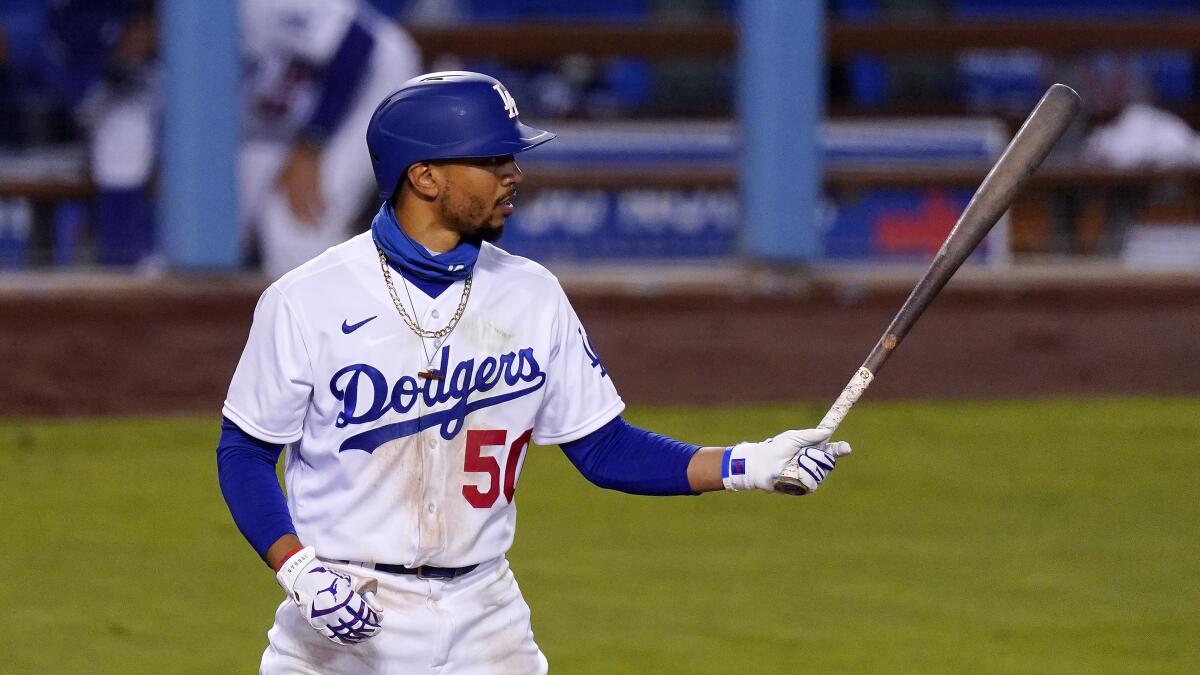
- Share via
They lined up shoulder to shoulder in front of the Dodger logo; a Black outfielder, a manager of Black and Japanese descent, a white starting pitcher from Texas and an Afro-Caribbean reliever.
Facing the media after the postponement of Wednesday night’s game against the San Francisco Giants, these Dodgers have never looked more like individuals.
Yet explaining the reason for the postponement, these Dodgers have never looked more like a team.
Mookie Betts wasn’t going to play, so they weren’t going to play.
Their lone active African American player was uncomfortable taking the field on a day of widespread social injustice sports walkouts, so they decided he would not be alone.
A teammate fighting for racial equality wanted to make a stand, so they were going to sit with him.
There has rarely been a more compelling sight in this organization since the days of Jackie Robinson. The Dodgers have rarely been so worthy of our unabashed cheers.
By speaking up about Juneteenth, Dodgers ace Clayton Kershaw underscored the importance of white athletes taking a stand that Black lives matter.
Said Betts: “For me, no matter what, I wasn’t going to play tonight, I have to stand by my guns here.”
Said Clayton Kershaw: “As a white player on this team . . . how can we show support? What is something we can do to help our Black brothers on this team? Once Mookie said he wasn’t going to play . . . we felt the best thing to do to support them was not playing.”
And so their most important game in many seasons was a game they didn’t play, their loudest message delivered on a night with no thumping gloves or cracking bats. In their quiet walkout in support of a single player protesting racial injustice, they roared.
This is what unity looks like. This is how togetherness feels. This is how champions are made.
This is not how it was across the rest of baseball, where only three games were postponed Wednesday and several protesting players were quite simply abandoned.
Matt Kemp sat out by himself in Colorado. Jason Heyward was the lone Chicago Cubs holdout. Dexter Fowler was joined in his St. Louis protest only by pitcher Jack Flaherty. Dominic Smith was the only New York Met to kneel during the national anthem, and was left alone to conduct a tearful videoconference during which he tried to explain his feelings.
While more postponements and acts of solidarity occurred Thursday, the message was clear: Throughout a baseball world not known for social awareness, teammates didn’t immediately understand. The Dodgers understood.
While the NBA and WNBA and MLS were shutting down games and some NFL teams were shuttering practices in protest of the Kenosha, Wis., police shooting of Jacob Blake, most baseball folks pulled their caps low and looked the other way. The Dodgers looked directly at Betts and listened.
The Dodgers and San Francisco Giants decided not to play their game on Wednesday to protest the shooting of Jacob Blake.
And, frankly, they could have found every reason not to listen. They could have found every excuse to express their support for Betts while still playing. Kershaw was scheduled to start, and how often does the future Hall of Famer like to change his routine? The Dodgers had the best record in baseball and were one of the hottest teams in baseball and who wants to play a rescheduled doubleheader?
The Dodgers didn’t care, and it wasn’t because newcomer Betts has been their best player and already become a clubhouse leader. It was because he was a teammate. Think about that.
“What some of our Black teammates, what some of the Black players around the league, some of the things they’ve been through, I’ll never understand, and it’s just trying to figure out how to support them in the best way possible,” Kershaw said. “And I don’t have the best answer. But for tonight, I feel like the right answer for us, for myself as a white man, was to sit out with them.”
Through that simple act, these Dodgers proved to be more than just the definition of team. These Dodgers are the definition of the Dodgers.
In 1947, in the first weeks of Jackie Robinson’s color-barrier-breaking debut season, teammate Pee Wee Reese walked over to Robinson before a game in hostile Cincinnati and draped his arm around him. The quiet gesture silenced the crowd and set the tone for his teammate’s public support.
In some ways, Wednesday’s news conference felt like that. The team’s only African American and one of its newest players took a potentially controversial stand against racism, and his teammates threw their arms around him and pulled him in.
Athletes in the NBA, WNBA, MLB, MLS, NFL, NHL and professional tennis refused to take part in scheduled events in protest of the shooting of Jacob Blake.
“When I saw that, I definitely made the connection with Pee Wee and all the players who supported Jackie,” said Fred Claire, former Dodgers general manager and longtime employee. “What the Dodgers did with Mookie Betts carried great meaning for that team and who they are. What I saw was unity.”
This unity spread to the front office, which supported manager Dave Roberts in his separate decision to also sit out Wednesday’s game. And how fitting that all of this occurred in a week that includes Friday’s baseball-wide Jackie Robinson Day celebration.
It is a legacy continued.
“I was already tight with everybody in the clubhouse, but now I know everybody has my back even more than I already thought,” Betts said, later adding, “I’ll always remember this day. I’ll always remember this team just having my back.”
That’s what teams do. That’s who these Dodgers are. That’s how, on a night they didn’t play a game, they earned a victory that will last forever.
More to Read
Are you a true-blue fan?
Get our Dodgers Dugout newsletter for insights, news and much more.
You may occasionally receive promotional content from the Los Angeles Times.

